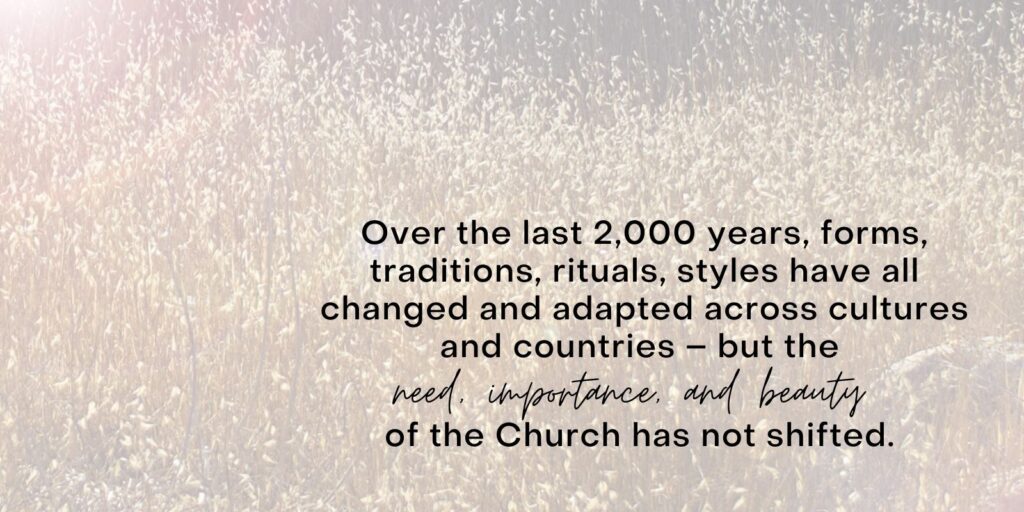Something changed in our culture in March 2020. When the COVID-19 pandemic hit, everything was impacted: public health, government, society, culture, business, economy, schools, and, of course, the church. For weeks or months, many churches didn’t have in-person worship gatherings. For a church community, that is significant. Most pastors will tell you the pandemic has had a major impact on church life.
Across the country, people responded differently to the situation in their local church. Some didn’t agree with how their church handled things, and they found a new church. Some that were very connected and involved in their local church, longed to return and came back with even greater investment. Some were on the fringes of a local church, and the time apart made them realize how much they wanted to get plugged in. Some had never been in a church, but the isolation from other parts of their life stirred a longing to connect with God and his people. Some found that they didn’t really miss church when it was gone, felt like they didn’t need church anyway. After all, you can get a lot done in those few hours on Sunday morning! Many of these people weren’t walking away from Jesus, they were just walking away from his church. Some people felt they could get all the church they needed online.
In fact, some Christians, and even whole churches, have decided that meeting together in a building on Sunday mornings is an unnecessary, outdated relic. What more could you want if you have your Bible, your favorite Christian worship artist, and favorite online preacher – you can go to church online anytime of the week! Some local churches have started online services, building virtual congregations with online pastors. But is this really God’s vision for church?
While there is much lost in the “virtual church” experience, that doesn’t mean that God can’t use it for kingdom purposes. While online worship is not the same – and can never be the same – as active, in-person engagement in a local church community, livestreaming church worship services can still be a valuable resource.
The reality is that using media to spread the Gospel and connect with those out of reach is nothing new. Since the 1940’s, worship and preaching could be heard broadcast on the radio. In the 70’s churches started tape ministries to share sermons with those who couldn’t be in church. In the 80’s, messages were recorded on video and shared outside the church walls. And even before all this technology, sermons were printed and read.
Livestreaming has a purpose. There will always be people home sick, new moms who have just given birth, and icy roads that prevent people from getting to church. Additionally, many new visitors watch our online worship service before visiting in person. And sending a poignant church link to a friend or family member to encourage them can be a great resource for evangelism and discipleship.
Yet, while online resources and livestream worship services are wonderful resources to help us through a crisis or serve a shut-in, it’s not the same as going to church, as being with the church. Except in the most extreme circumstances, livestream worship should not be anyone’s primary, long-term connection to the local church. It’s not the full biblical vision.
Scripture lays out a clear vision for the beauty, glory, and necessity of gathering in the local church. We can define the local church as an organized and committed family of Christians, led by elders and deacons, who gather regularly to worship Jesus Christ, sit under the teaching of God’s Word, practice Baptism and the Lord’s Supper, love and serve one another, and live out and proclaim the Gospel as a light to the world.

The Scriptures frame the church as…
- The Bride of Christ – Jesus loves the church and sacrificed himself to purify her (Eph. 5:23-30).
- The Household of God – The church is a place where brothers and sisters relate together as family with leadership and accountability (1 Tim. 3:14-15, 5:1-3).
- The Body of Christ – There are many members in the church – each with different gifts – and they all work together in unity (1 Cor. 12:12-27).
- The Temple of God – The church is the dwelling place of God’s Spirt on earth where people worship and minister and reach out to the lost (1 Pt. 2:4-10).
It is critical that Christians uphold the priority and necessity of the local church, even when church life is difficult. Since Jesus ascended to heaven and sent the Spirit, he has been at work in his Church. Over the last 2,000 years, forms, traditions, rituals, styles have all changed and adapted across cultures and countries – but the need, importance, and beauty of the Church has not shifted. The church is ancient, but it is not outdated. The church is traditional, but it is a tradition grounded in the Word of God and full of the Spirit of God. Church expressions may feel modern or contemporary, but make no mistake – gathering in the local church is an ancient, biblical, beautiful, necessary Christian tradition.
Christian, be excited about what God is doing in his Church!
